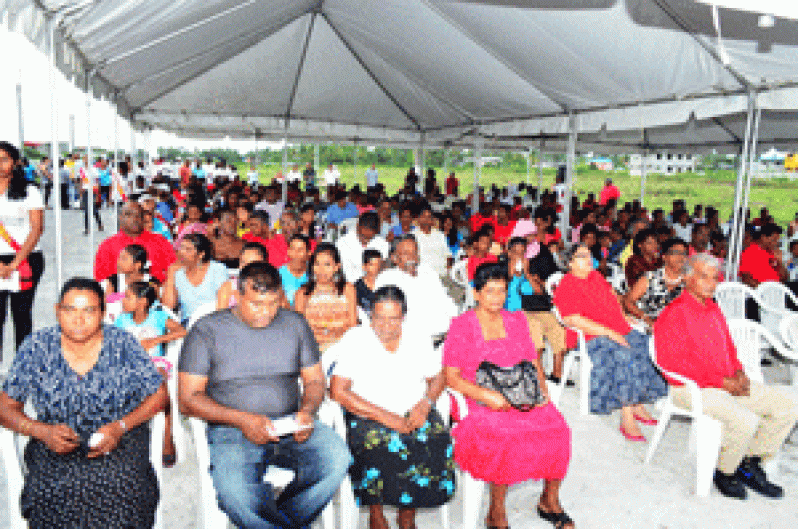TEACHERS and parents of Region One (Barima/Waini) students have indicated to the Ministry of Education that, while the majority of them are supportive of retaining corporal punishment in schools, and to have students repeat a class instead of being automatically promoted, those who were against these policies also needed to be heard.  The Region One response was made known during the National Consultation with teachers and parents on Grade Repetition/Retention and Automatic Promotion and Corporal Punishment, held in that region earlier this week.
The Region One response was made known during the National Consultation with teachers and parents on Grade Repetition/Retention and Automatic Promotion and Corporal Punishment, held in that region earlier this week.
The exercise, which was spearheaded by Technical Assistant and Co-ordinator of School Boards, Ministry of Education, Ms. Melcita Bovell, took place at the Hosororo and Kamwatta primary schools.
Ms. Bovell explained that the education policy makers had decided that the system would be tried for two years, before seeking the feedback. She impressed on persons present that honest responses were needed on the policies.
Automatic promotion
On the issue of automatic promotion, as against repeating a class, she raised the question about whose fault it was if a child failed.
There were varied responses to this question, with some persons saying it was the teacher’s fault, and others saying the fault was with either the parents or the students themselves.
However, Bovell stated that the fault would lie in the education system at all levels. She stated that the Ministry of Education does not have any views on the issues. The views of the teachers and parents, she explained, were of paramount importance to the Ministry in making a decision on the policies, thus the request for honest responses.
The responses were varied on the issue of automatic promotion, with some teachers stating that it should stay, and others not being enthused with the thought of working extra hours; while still yet others were concerned about the children travelling far distances getting back home too late after the extra remedial lessons. Others wanted the policy with conditions attached, and some did not want it at all.
Headmaster of the North West Secondary School, Malcolm Marcus, was of the view that this policy should only be applied to slow learners, a view which was supported by some, who noted that some children are late starters.
Additionally, it was felt that students’ records should be passed on to the next class teacher as the students were moved up.
Others felt that the policy should not continue, and that children should carry on working at the same level until they achieved a passing grade, notwithstanding the fact that some of them soon become much older than new students coming into the same level.
Bovell noted that from the responses received, it clearly came across that there was a need for remedial programmes to be implemented early in a student’s education, which would enable teachers to size the problems early and solve them.
Corporal Punishment
On the issue of corporal punishment in schools, Ms. Bovell noted that this policy was a very serious one. She described UNICEF’s (United Nations Children Education Fund) determination of Corporal Punishment as: ‘The use of physical force, causing physical pain, but without wounds, as a means of discipline’. Bovell expressed the hope that someday Guyana will be listed among countries that have abolished the policy.
She further pointed out that while some teachers just do not understand the limits and take it out on the students, the Laws of Guyana do allow for Corporal Punishment; nevertheless, at some point in time it could become abuse.
Notwithstanding, the majority of both teachers and parents at the consultation exercise, were in favour of keeping it, while they were prepared to listen to those who were not; and yet a very few remained undecided.
HM Marcus was of the firm view that it should remain, but should be administered according to the guidelines set out in the handbook used by schools to maintain discipline, and should only be applied to those students who were most undisciplined.
A Head Mistress from Yarakita pointed out that teachers are sometimes threatened by children, and even parents, when they attempt to discipline their students.
Most parents, however, felt that the policy should remain in place, and supported HM Marcus’s point that it should only be applied to those students who were most unruly.
But Nathaniel Stuart, Peace Corps Volunteer Teacher in Region One, felt the policy should be abolished, and advised that there are other methods to discipline students.
Bovell observed that most of the points made indicated that the students needed to be disciplined; therefore, the teachers should be allowed to administer it.
She noted that the consultation in Region One specifically was making a serious mark on the decision making process at the Ministry of Education.
Bovell assured parents, teachers and other stakeholders that the Ministry of Education would continue consultations across the country.
Meetings were already held in Regions Four and Six.




.jpg)









